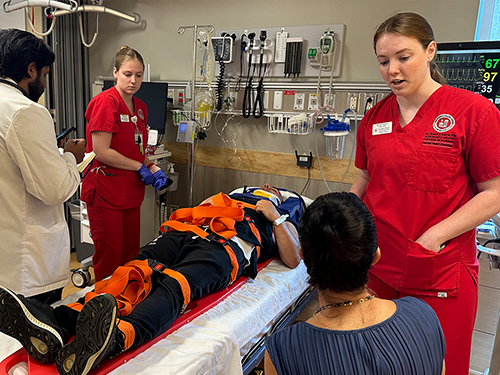
Minor in Social Work
Why Earn Your Minor in Social Work at Sacred Heart?
A minor in social work equips you with the skills to understand human behavior, support individuals and communities and advocate for social justice—no matter your major. The program includes elective options that let you focus on the areas that interest you most. It’s a valuable complement to careers in healthcare, education, business, criminal justice and more.
Required Courses | 12 credits
Equivalent courses may be waived in the SHU MSW Program, if accepted, with a B or better (except for SW 101)
Emphasis is on human diversity. This course is designed to give students an understanding of the conditions that lead to minority emergence and the consequence of minority status; it fosters acceptance of diversity, cultural pluralism, and social change.
Explores the profession of social work as a career choice. Focuses on generalist social work practice as a societal response to social problems with an orientation to professional knowledge, skills, values, and ethics.
Provides a framework for understanding how diversity and inclusion shape the human experience, especially through consideration of cultural, structural, and constructed social and political norms.
Examines how social policy is formulated and implemented with a focus on the inequalities and inequities in social welfare policy that express institutional discrimination. Emphasizes the development of macro practice skills.
Prerequisite: Take SW-101 and PO-121
Theories of human development with emphasis on stages of the life cycle; human diversity; and the biological, psychological, socioeconomic, spiritual, and cultural influences on development.
Prerequisite: Take PS-110
Prerequisites/Supporting Courses
This course examines science as a process to understand basic biological concepts of cells, genetics, evolution, and ecology. Students will examine current biological research and how that impacts their lives and the future of humankind. Three hours of lecture per week. Non-science majors. A prerequisite to SW 267.
Focuses on human physiology and the role humans play in the health and maintenance of their bodies. Topics include human organization, processing and transporting, integration and coordination, and reproduction. Three hours of lecture per week. Non-science majors. A prerequisite to SW 267.
Examines the theoretical foundation of American government, the U.S. Constitution, political behavior, interest groups, political parties, Congress, the presidency, and the Supreme Court.
Introduction to psychology as the science of behavior, focusing on the physiological, cognitive, learning, sociocultural, and psychodynamic bases of behavior.
Students are taught how to investigate social issues as sociologists do-by tracing the troubles of men and women back to broader social forces and problems. The relevance of sociology is demonstrated through examples of applied sociology and through the students' use of social theory and methods to address social problems.
Major socioeconomic developments in twenty-first-century capitalism (e.g., consumer culture, global labor market, media empires) are studied. The persistence of inequality and poverty, fragmentation of family and community, unhealthy constructions of selfimage, and other social problems are explained in terms of these developments.
Electives | 6 credits
Equivalent courses may be waived in the SHU MSW Program, if accepted, with a B or better (expect for SW140)
This course will introduce students to current and historical issues and controversies of human rights and social justice through case studies, lectures, and group work.
Students learn how to design, conduct, and report the results of social research. Attention is given to experimental and evaluation research, field research, unstructured exploratory interviewing, content analysis, analysis of published statistical data, survey research, conceptualization and operationalization of variables, analysis of data, the writing of research reports, and the logic of cause and effect in research. The course also includes learning how to use the Statistical Package for the Social Sciences (SPSS) software to analyze quantitative data. A prerequisite to SO 384
Prerequisite: Take SO 110 and 3 credits 200 or 300 SO courses
The effects and characteristics of family violence from the legal, medical, and social perspectives. Incidence and preconditions of child abuse, spousal abuse, and elder abuse are studied.
An introduction to the social service delivery system and resources, the values and ethics inherent in policy, and the role of the social work profession. Includes a global perspective on comparative social welfare systems.
Prerequisite: Take SW-265
A study of diverse family, group, community, and organizational systems and their impact on human development and behavior. Theoretical knowledge and assessment skills are emphasized.
Prerequisite: Take SW-267
More Information
The Latest in School of Social Work
View More News-
 Academics, Faculty & Staff SpotlightPublished:Titles cover topics from crisis communication to the politics of the Caspian Sea
Academics, Faculty & Staff SpotlightPublished:Titles cover topics from crisis communication to the politics of the Caspian Sea -

New Organizational Transformation Fellows Named
Academics, Advancing SHUPublished:Faculty and staff will collaborate on projects that advance workplace culture, professional growth and organizational change -

Students Learn How Teamwork is Key to Patient Care
AcademicsPublished:Interprofessional simulation brings together students from seven SHU programs

